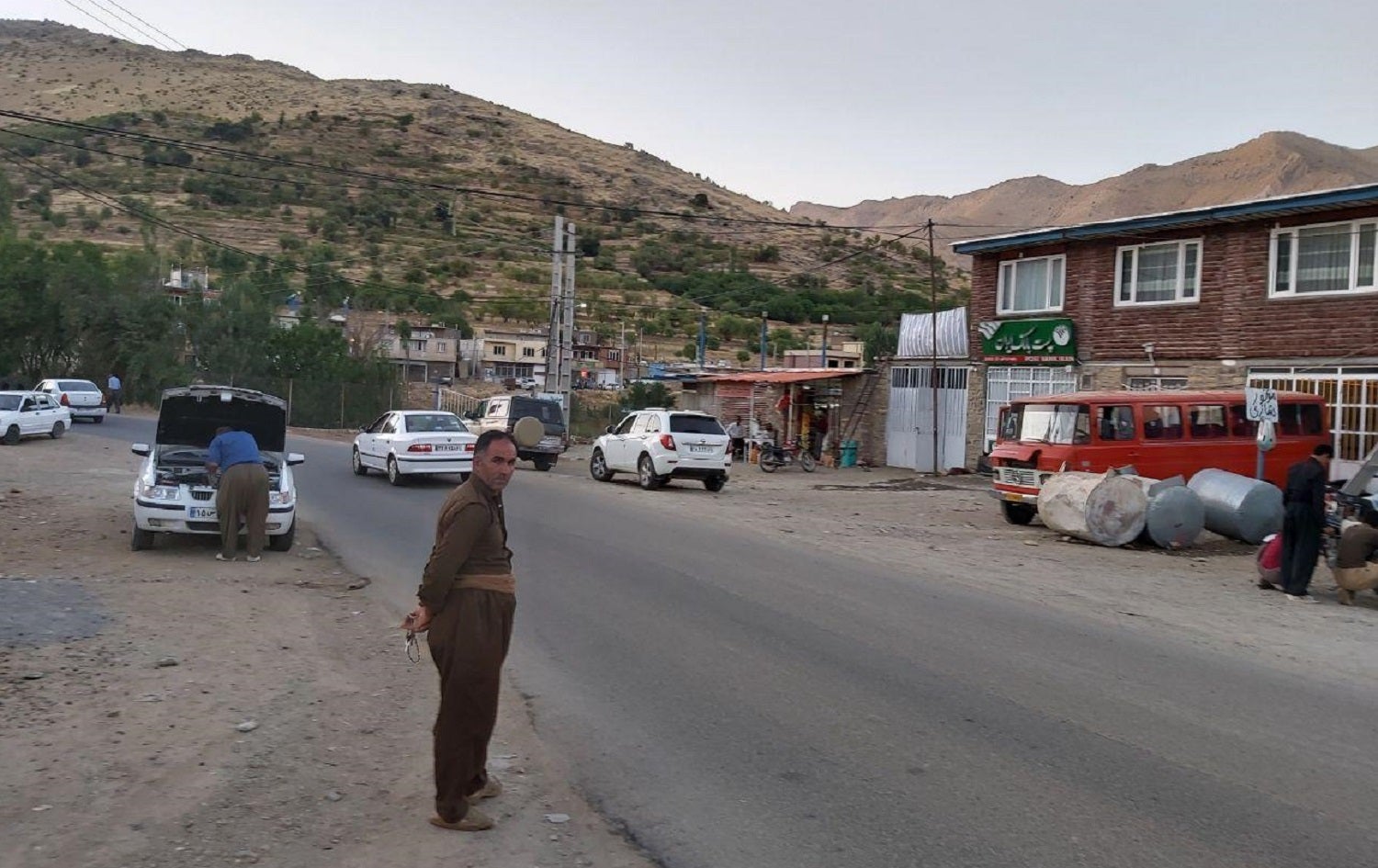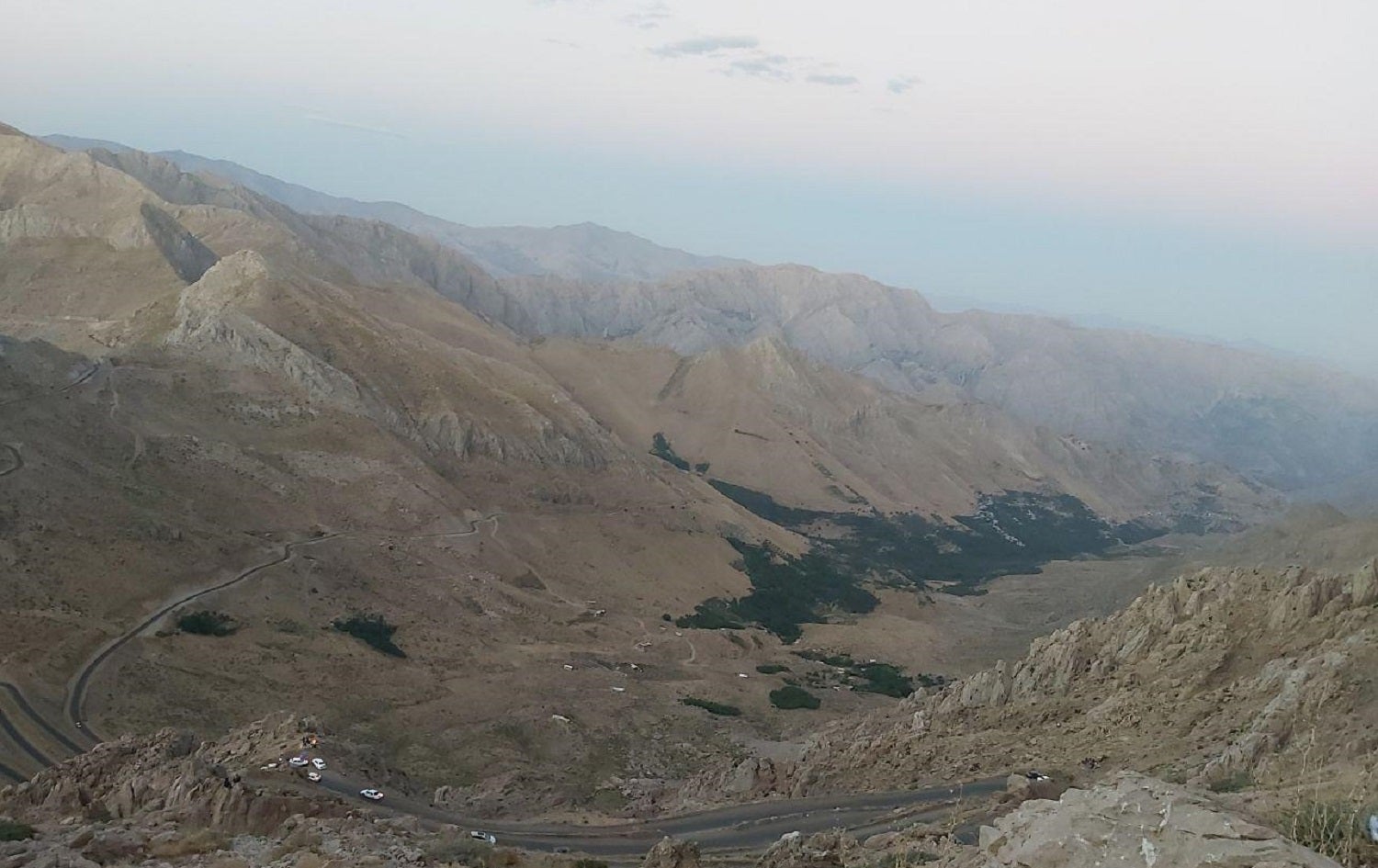
Barzan Qadiri (center, drinking tea) and his friends discuss leaving their home village of Dizli, Hawraman for Europe on August 8, 2020. Photo Jabar Dastbaz / Rudaw
MARIWAN, Iran — Rivers and forests line the road south from Mariwan, in the Hawraman region of western Iran, to Dizli, a village and tourist spot whose streets are embellished with tea parlours.
Upon arrival, I spot a brand new, three-story house stand pride of place. Two sons from its family moved to the United Kingdom four years ago, my driver, himself from Dizli, told me.
"This family was once destitute, but their situation has improved thanks to the sons who send them money."
Hawraman, situated between the two Kurdish provinces of Kermanshah and Kurdistan, has become a portal from which Iran's Kurdish youth head to the West, notably Britain. Decades of corruption and economic mismanagement in the country have been topped off by years of crushing US sanctions, leaving some Iranians to feel compelled to leave home.
Fifteen kilometers down the road from Dizli was the village of Daraki. It too has seen droves of its men leave for Europe.
Daraki resident Saaed Jemali, 55, explains that some locals feel as though their prospects here are limited, and even dangerous.
"As you can see, it’s hard to farm or raise livestock in this village because it’s in the mountains. All you could do is become a kolbar, or work in construction, a business that has recently weakened," Jemali told Rudaw English, his fingers rifling through the long, thin strand of beads on a tasbih.
He pauses for a sip of tea.
“This generation is not like mine. They’re not satisfied with a simple meal – they’re looking for a better life.”
When Iran came to a landmark nuclear deal with the permanent member states of the UN Security Council and Germany in 2015, it seemed as though the financial prospects of everyday Iranians would begin to look up. But the Trump administration pulled the US out of the accord in May 2018, then re-imposed its strict, pre-deal economic sanctions in November of that year. As inflation and unemployment rates grew, some Iranians saw no other way out of the decline than to leave the country.
Jemali’s son sold his house – his only asset – to raise enough money to make it to the UK.
“My son, who is 30, has been living in Britain for the last two years. He was very smart. He used to live in Tehran. But after the crisis happened, it became pointless for him to continue working there," Jemali said.

Immigration to the West has cost local lives. As we left Daraki, we drove past an elderly woman in black, walking with the help of a cane. The driver recognized her, and knew a devastating part of her story.
"She had just one, unmarried son,” the driver said. “He left for Europe two years ago, taking all the savings he had with him. He drowned in the waters between Greece and Turkey, and the smugglers took all his money."
We finally reached our destination – the cool heights of Mount Tata, a domestic tourist spot. There I met Qadiri, a 24-year-old man who has plans to migrate to Europe.
"We’ve waited so long for the economic situation to improve, but instead it just keeps getting worse," Qadiri said.
Matters are made worse by the strict cultural rules of Iran’s Islamic regime that Qadiri said prevents him and other young men from having their fun.
"If we want to enjoy ourselves and drink some wine, we have to hide it in fear when we get to the checkpoints," he said.
"I’m doing well financially – I own a shoe shop – but I’d rather sweep the streets of Europe than be a businessman in Iran.”
Qadiri was set to meet the smuggler, a relative of his, at his home in west Mariwan one night. He agreed to me joining him at the meeting, where I would pretend to be someone interested in leaving for Europe.
We pulled up to the front of a four-story building on an affluent street. A teenager opened the front door and walked us up to an apartment on the third floor. We were welcomed in by the average height, overweight smuggler, who Qadiri introduced as "Mr. Jalal".
As soon as we sat down, Mr. Jalal began talking about Iran's economic woe.
"By God, the situation gets worse in Iran with every passing day. By God, it’s better to leave today than tomorrow because the toman keeps dropping in value,” Jalal said.
"I charge other people 400 million tomans ($18,000), but since I know Barzan, I’ll cut it to 300 million tomans ($14,000)," he said.
Jalal points at me. “Since you’re Barzan’s friend, I’ll charge you the very same fee.”
“I’ll take you there using a safe route, one where you won’t have to go on foot,” Jalal said in reassurance. "I will travel with you from Urmia to Istanbul."
We would each be charged $1,000 upon arrival in Istanbul, Jalal explains. From Istanbul, the gateway to Europe, the journey to Italy would take a week. There, we would pay another $5,000. “It may take another week for you to arrive in Britain. Once you arrive, you pay the rest of the fee into my bank account.”
With Europe still in the grip of the coronavirus, “now is the right time to leave,” Jalal said. “Coronavirus has reduced traffic and the police aren’t paying as much attention to inspections.”
Jalal’s explanation of the journey was so persuasive that I was nearly convinced I too needed to leave.

For Masoud Karami, an Iranian Kurd from Kermanshah province, the reality of the journey across Europe was far from as smooth as Jalal’s sales pitch made it sound.
"I was a master's student, majoring in political science at the Kermanshah University. But I was despondent about the future, and the collapse of economy forced me to decide to leave on June 6, 2019," the 37-year-old told Rudaw English via WhatsApp.
Karami first moved to Erbil, from where he got in touch with a smuggler through a relative. Three and half months, 7,500 euros, and 12 countries later, he made it to Amsterdam.
In what Karami describes as the “worst part, worst memory” of the journey, he witnessed a mother separated from her child and husband when they were all meant to embark on the journey from Istanbul to Greece.
“The woman got on the boat, and just before the man and the child tried to get on, the Turkish police fired on them. The skipper kept the boat moving, separating the wife from the husband and the child."
Karami said he and other migrants spent four days in a Greek forest without food, waiting on the vehicle a smuggler he’d paid 2,500 euros had promised. One of the men he was with knew of the area. Together, they walked for 20 hours, reaching the Greek port city of Thessaloniki.
“We found another smuggler who charged us 4,800 euros to take us to Italy."
In Croatia, the “police treated us like animals" before sending them back to Bosnia at three in the morning. In Bosnia, men, women and children were forced to swim across a river because the police wouldn’t let them cross a bridge. In Slovenia, he was arrested, his phone confiscated and never returned.
"Every step I took on that journey was full of insult and danger," Karami said. "I don’t know how I endured it all.”
“I was forced to leave my home country. If I could go back in time, I would never have made such a deadly decision. My body is here, but my heart and mind remain in Kurdistan," he said.
Karami, his wife and their two children await the processing of their asylum application.
"This is not the paradise we dreamed of. It’s not worth sacrificing your life for."
Translation by Zhelwan Z. Wali








Comments
Rudaw moderates all comments submitted on our website. We welcome comments which are relevant to the article and encourage further discussion about the issues that matter to you. We also welcome constructive criticism about Rudaw.
To be approved for publication, however, your comments must meet our community guidelines.
We will not tolerate the following: profanity, threats, personal attacks, vulgarity, abuse (such as sexism, racism, homophobia or xenophobia), or commercial or personal promotion.
Comments that do not meet our guidelines will be rejected. Comments are not edited – they are either approved or rejected.
Post a comment